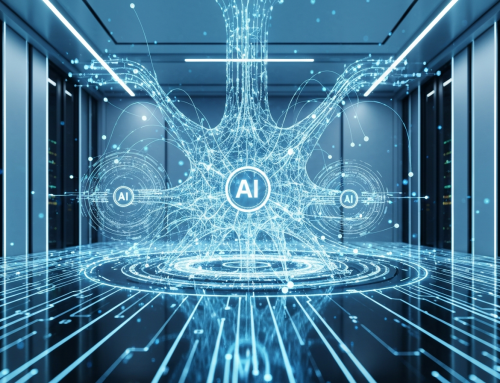The Dawn of Intelligent Automation: Why AI Workflow Platforms are Critical
In today’s fast-evolving business landscape, achieving peak performance demands more than traditional automation. It requires intelligent automation, driven by sophisticated AI Workflow Platforms. These platforms are not merely tools for automating repetitive tasks; they are strategic enablers that transform how organizations operate, make decisions, and innovate.
The urgency for this transformation is evident. By the end of 2025, AI-enabled workflows are expected to skyrocket from just 3% to 25% of all enterprise processes, representing an eightfold surge in adoption. This dramatic shift underscores a fundamental truth: AI only delivers its full potential when seamlessly embedded within real business workflows, translating insights into automated actions, approvals, and notifications. Organizations that embrace this shift are not just optimizing; they are fundamentally rewiring their operations to capture significant value. In fact, a McKinsey Global Survey on AI found that 78% of organizations now use AI in at least one business function, highlighting its growing indispensability.
AI workflow automation differentiates itself from conventional, rule-based automation by incorporating advanced intelligence. It leverages machine learning, natural language processing, and predictive analytics to understand context, adapt to changing conditions, and make data-driven decisions autonomously. This intelligent approach allows businesses to streamline complex processes, reduce manual effort, and free human talent for more strategic, creative, and high-value work.
Unlocking Business Value: The Strategic Advantages of Modern AI Workflow Platforms
The benefits of integrating AI into business workflows are profound and far-reaching, impacting efficiency, cost, customer experience, and overall strategic agility. Modern AI Workflow Platforms offer game-changing advantages that empower businesses to thrive in a competitive environment.
- Enhanced Operational Efficiency: AI-powered tools dramatically reduce the time spent on routine tasks like data entry, approvals, and task routing. By minimizing human intervention in repetitive processes, employees can focus on higher-value work, leading to significant productivity gains. Studies indicate that AI workflow automation can improve worker performance by nearly 40%.
- Significant Cost Optimization: Eliminating redundant tasks, minimizing errors, and optimizing resource allocation directly translate into substantial cost savings. Organizations implementing comprehensive business process AI integration typically report cost reductions of 25–50% in targeted process areas. The PwC also forecasts that AI could contribute $15.7 trillion to the global economy by 2030, a testament to its economic impact.
- Scalable Process Management: A critical advantage is the ability to scale operations without proportional increases in resources or complexity. AI systems intelligently adapt to changes and new requirements, handling unexpected situations and growing workloads without compromising quality or accuracy.
- Real-Time Decision Support: AI workflow platforms transform decision-making by providing instant access to analyzed data, predictive insights, and recommendation engines. This enables faster, more informed decisions at every organizational level. For example, a logistics company might deploy AI-powered route optimization that continuously adjusts delivery schedules based on real-time traffic, weather, and order priority data.
- Improved Customer and Employee Experience: By automating routine inquiries and providing personalized support, AI systems enhance customer satisfaction. Similarly, for employees, AI-powered support systems offer immediate assistance, freeing up internal teams to address more complex issues. The principles of AI in customer service apply equally to internal support functions, creating consistent experiences across the organization.
- Enhanced Compliance and Risk Management: AI workflow platforms significantly improve regulatory adherence by enforcing consistent processes, maintaining comprehensive audit trails, and adapting quickly to changing requirements. This proactive approach reduces compliance risks and minimizes penalties in highly regulated industries.
- Driving Innovation: AI empowers businesses to innovate by enabling creative processes previously reliant on human effort. AI-driven design tools, generative models, and automated ideation platforms allow organizations to brainstorm new concepts, develop products, and refine solutions faster than ever before.
Choosing Your Edge: Essential Capabilities of Leading AI Workflow Platforms
As businesses navigate the crowded market of intelligent automation solutions, identifying the core capabilities that define truly effective AI Workflow Platforms is crucial. The right platform must go beyond basic task automation to offer deep intelligence, flexibility, and robust management features.
Key features to look for include:
- Native AI Capabilities: A leading platform should offer AI as a first-class citizen, not just an add-on. This means native support for embedding machine learning models, applying natural language processing, using generative AI, and making predictions as integral parts of a workflow.
- Real-Time Data Connectivity: Intelligent workflows demand timely data. The platform must ingest, process, and act on real-time signals from across your ecosystem, whether it’s a CRM update, inventory change, or sentiment analysis, without relying on static, batch-only data pipelines.
- Low-Code/No-Code Builders: To scale automation across teams, platforms must be accessible. Drag-and-drop builders, prebuilt logic blocks, and intuitive user interfaces empower non-technical users to build and modify workflows, while still offering depth and control for technical teams.
- Flexible Integrations and Extensibility: Seamless integration with existing tools (CRM, ERP, databases) is fundamental. Equally important is extensibility, allowing connections to custom APIs, scripts, or webhooks, ensuring the platform can evolve with your tech stack.
- Automation Orchestration and Conditional Logic: The best platforms orchestrate entire processes, not just individual tasks. This includes supporting complex conditional logic, branching paths, exception handling, and sequential triggers across multiple systems.
- Scalability and Performance: A robust platform must withstand real-world loads, supporting thousands of concurrent workflows and handling data volume spikes without performance degradation.
- Governance, Security, and Visibility: As AI automation expands, stringent governance is critical. Look for permission controls, audit logs, role-based access, and usage analytics to ensure data protection, compliance, and transparency.
- Model Lifecycle and Feedback Loops: For platforms embedding AI models, support for retraining models based on new data, monitoring performance, and feeding outputs back into training pipelines is essential for continuous improvement.
Top AI Workflow Platforms for Intelligent Automation in 2025
The landscape of AI Workflow Platforms is dynamic, with various solutions catering to diverse business needs. Here are some of the leading platforms recognized for their capabilities in intelligent automation:
While the market offers a range of powerful options, understanding their strengths helps in selection:
- FlowForma: Known for its no-code Digital Process Automation (DPA) tool, enabling business users to digitize complex processes with AI-powered Copilot for rapid workflow creation. It emphasizes robust compliance and operational efficiency.
- Domo: Combines live data, visual dashboards, AI services, and code-enabled steps for automated workflows. Its AI Service Layer integrates various models for predictive operational dashboards and customer experience monitoring.
- Appian: A low-code platform that delivers end-to-end process automation with RPA, AI, and IDP. It focuses on orchestrating mixed-autonomy scenarios where technology, data, and human workers collaborate for optimized business outcomes. Appian’s AI Copilot, for instance, allows insurers to leverage generative AI to quickly design claims submission interfaces from PDFs.
- Automation Anywhere: An RPA platform with added AI capabilities for intelligent automation. Its Agentic Process Automation (APA) system enables reasoning AI agents to dynamically plan and adapt work across humans, bots, and systems.
- UiPath: Stitches together RPA bots, AI models, and human-in-the-loop interactions. Features like Agentic Automation/AI Fabric enable bots to make context-informed decisions, and Document Understanding supports NLP and handwriting recognition for document-heavy workflows.
- Microsoft Power Automate: Offers low-code automation within the Microsoft ecosystem, integrating seamlessly with tools like Outlook and SharePoint. It includes AI Builder for image/text analysis and sentiment, ideal for internal workflow automation.
- Make (formerly Integromat): Provides a visual interface for multi-step workflows, allowing embedding of AI calls like OpenAI or Google Cloud APIs. It offers robust conditional logic and error handling.
- Zapier: A widely used automation tool that has expanded its AI capabilities through Zapier AI. This includes generative AI tools and GPT-powered actions for smarter, context-aware flows, connecting thousands of apps.
- Workato: An enterprise-grade integration and automation platform supporting complex logic and embedded AI capabilities like predictive analytics and document classification. It features “Recipes” to chain business rules, AI decisions, and cross-app actions.
- n8n: An open-source workflow automation platform known for its flexibility and developer control. It supports hundreds of integrations and allows custom JavaScript functions and external AI service calls, enabling the building of customized workflows with AI/ML logic. The Synthesia AI tools blog mentions n8n as a top AI automation tool.
- ProcessMaker: A business process management (BPM) platform with strong support for structured approvals, case management, and AI-driven decisioning, offering a low-code designer and AI tools for form processing and routing.
- Lindy.ai, Gumloop, Relevance AI, VectorShift, and Relay.app: These are newer AI-native workflow automation tools gaining traction, as highlighted by Whalesync. They emphasize features like custom AI agents, AI triggers, Chrome extensions for browser automation, and multi-LLM integration.
Integrating Advanced AI: From LLMs to Custom AI Agents and Beyond
The true power of modern intelligent automation lies in its ability to harness sophisticated AI technologies, particularly Large Language Models (LLMs) and custom AI agents. These capabilities enable AI Workflow Platforms to move beyond predefined rules and engage in dynamic, context-aware processes.
At the heart of many advanced AI workflows are LLMs, which can understand and generate human language, making them invaluable for tasks like summarizing legal documents, analyzing text data, or powering conversational interfaces. Platforms leverage these models to introduce a new level of autonomy and intelligence into automated processes.
Building Effective AI Agents
AI agents are autonomous systems designed to perform complex tasks with minimal human intervention. Unlike traditional automation scripts, which follow rigid instructions, AI agents can interpret context, reason, plan, and use tools dynamically to accomplish goals. According to Anthropic’s engineering insights, the most successful implementations use simple, composable patterns rather than overly complex frameworks. Key components of an AI agent often include:
- Planning Modules: These break down complex tasks into manageable subtasks, enabling the agent to reason through problems. Techniques like Chain-of-Thought and Tree-of-Thoughts help LLMs decompose tasks and plan actions.
- Memory Systems: Agents require both short-term memory (for current context) and long-term memory (for accumulated experiences and knowledge) to operate effectively over extended periods. This often involves external vector stores for fast retrieval of relevant information.
- Tool Usage: Agents interact with external environments (e.g., search APIs, code interpreters, databases) through tools. This allows them to gather information, execute actions, and obtain observations to complete subtasks.
The architecture of such platforms often involves intricate integrations. As discussed in “Building an AI Agents Platform with LLMs,” a robust platform requires dynamic Retrieval Augmented Generation (RAG) for information retrieval, vector stores for embeddings, and orchestration engines for managing multiple LLMs and AI agents. This complex interplay of technologies allows for multimodal data processing, interpretability, and secure code execution.
The emergence of agentic systems represents a significant leap forward. Companies are now building platforms like LlamaIndex’s AgentWorkflow, which focuses on empowering AI agents to extract information, synthesize insights, and take actions over complex enterprise documents, redefining document workflows.
Driving Peak Performance: Real-World Impact and the Future of AI Workflows
The real-world impact of advanced AI Workflow Platforms is evident across various industries, where they are not only optimizing existing processes but also enabling entirely new capabilities. From revolutionizing customer service to transforming internal operations, intelligent automation is a catalyst for peak performance.
Transformative Use Cases Across Industries
AI workflow automation is reshaping core business functions:
- Human Resources: Automating onboarding paperwork, managing time-off requests, and personal information updates through AI assistants makes HR operations more efficient and personalized.
- IT Management: AI-powered systems handle tasks like password resets, software provisioning, and proactive monitoring of device health, significantly reducing IT teams’ time spent on routine support.
- Sales Operations: AI automates tedious data entry and CRM updates, keeps customer records accurate, and helps sales teams focus on building relationships. AI assistants can draft personalized messages and provide customer insights. The future of CRMs is being shaped by AI in sales workflows, allowing for predictive analytics and automated lead scoring.
- Financial Services: Automating credit risk assessments, invoice processing, and fraud detection with AI algorithms enhances accuracy and speeds up critical financial processes.
- Healthcare: AI-enabled solutions analyze patient data, streamline administrative processes, assist in diagnostics, and automate appointment scheduling, leading to more efficient and accurate patient care.
- Supply Chain and Logistics: Machine learning and predictive analytics optimize demand forecasting, inventory levels, and route planning, contributing to improved efficiency and sustainability.
The Future: Agentic AI as the Next Frontier
The evolution of AI is moving rapidly towards “agentic AI,” where AI systems operate with even greater autonomy and planning capabilities. As outlined in McKinsey’s “Superagency in the workplace” report, this involves AI agents that can converse with customers, plan subsequent actions (like processing payments and checking for fraud), and even orchestrate complex marketing campaigns. This vision of a “digital workforce,” where humans and automated agents collaborate, is set to unlock unprecedented levels of creativity and productivity.
Key trends shaping the future of AI workflow automation include:
- Rise of AI Agents: Autonomous systems will manage end-to-end processes with minimal human input, interpreting context, making decisions, and coordinating multiple tasks across platforms.
- Deeper Generative AI Integration: Generative AI will become even more embedded in operational workflows, producing reports, drafting updates, and summarizing complex data automatically.
- Predictive Automation: The shift from reactive task management to proactive optimization will see AI forecasting delays, resource constraints, or compliance risks before they impact operations.
- Low-Code AI Tools: These will continue to democratize automation, enabling business users without deep technical skills to build and manage intelligent workflows.
- Focus on AI Governance and Data Privacy: With increased AI adoption, stringent emphasis will be placed on transparency, compliance, and ethical use of automation technologies, especially concerning sensitive data. This ensures that as AI models interact with data, privacy is maintained and potential biases are mitigated.
The journey towards full AI maturity requires leaders to set bold ambitions, invest in employee training, and continuously adapt to new best practices. The technology is rapidly advancing, and employees are ready; the challenge lies in strategic leadership to integrate AI effectively and ethically, driving innovation and creating real business value.
Elevate Your Operations with Intelligent Automation
Embracing intelligent automation through advanced AI Workflow Platforms is no longer a luxury but a strategic imperative for businesses aiming to thrive in the modern economy. The integration of AI, from powerful LLMs to sophisticated custom agents, offers an unparalleled opportunity to streamline operations, enhance decision-making, and foster a culture of continuous innovation. By leveraging these platforms, organizations can automate tedious tasks, free up valuable human capital for strategic initiatives, and respond with unprecedented agility to market demands. The future of work is collaborative, intelligent, and automated, and businesses that proactively adopt these transformative technologies will be best positioned to unlock peak performance and achieve sustainable growth.
Ready to unlock the full potential of AI Workflow Platforms for your business? Transform your operations with intelligent automation. Schedule a consultation with Idea Forge Studios today to discuss your web development, e-commerce, or digital marketing needs. You can also reach us directly at (980) 322-4500 or via email at info@ideaforgestudios.com.








Get Social